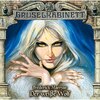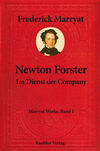Buch lesen: «Percival Keene», Seite 24
Chapter Thirty One
The Circe, thirty-two, to which I had been appointed, was a small but very beautiful frigate and as far as I could judge by her build as she lay on the stocks, had every requisite for sailing well.
When I took my leave of Lord de Versely, he told me that he should come down on the first of the following month (September) to Madeline Hall, where his aunt, Miss de Versely, was still flourishing at a green old age. “Here is a letter of introduction to her, Keene,” said he, “as she has not seen you since you were a few months old, and therefore it is not very likely that she would recognise you. Take my advice, and make yourself as agreeable to the old lady as you can; you will find Madeline Hall a very pleasant place, when you are tired of the dockyard and the smell of pitch and tar.”
I thanked his lordship, and we parted with much more cordiality shown by him than I had experienced.
I hardly need say, that the first person who came to congratulate me on my arrival at Portsmouth was my old friend an adviser Bob Cross. “Well, Captain Keene,” said Bob, as I shook him warmly by the hand, “I’m delighted at your success, and I know you will not be sorry to hear that I am getting on as well as I could wish in my small way; Jane and I are to be married in a few days, and I hope you will honour me by being present at the wedding.”
“That I will, Bob, with pleasure,” replied I; “let me hear all that has taken place.”
“Why, sir, it’s told in a few words. I took your advice, and brought the old gentleman presents, and I sat with him and heard all his old stories at least fifty times over, and laughed at his jokes as regularly the last time as the first; and he told Jane and her mother that I was a very pleasant, sensible and amusing young man—although he had all the talk, and I had none. The fact is, sir, it was he who first brought up the subject of my splicing his niece; that is to say, he hinted how he should like to see her well settled, and that if she married according to his wishes, he would leave her all he had.
“Well, sir, it was the opinion of Jane and her mother, that, as he was a whimsical, changeable old chap, it would be right for her to refuse me at first; and so she did, very much to the old man’s annoyance, who then set his mind upon it, and swore that if she did not marry me, he would not leave her a farthing. After a few days of quarrelling, Jane gave in, and the old chap swears that we shall be married immediately, and that he will give us half his property down at once.”
“Strike the iron while it’s hot, Bob,” replied I. “Is the day fixed?”
“Not exactly, sir; but we are to be put up in church next Sunday, and it takes three Sundays. I hope you won’t part with me, sir,” continued Bob. “The Diligente will be paid off on Tuesday, they say, and if you could get me appointed to the Circe—”
“Why, Cross, you are thinking of going to sea again, even before you are married. I should advise you not to be in such a hurry. You must not displease the old gentleman; besides, you must not leave a young wife so soon.”
“That’s very true, Captain Keene, but I don’t think I should be comfortable if I knew you were afloat without me.”
“I suppose you think that I cannot take care of myself.”
“Yes, I do, sir; but still I know that I should fret; and, sir, it will be four months at least before the Circe is ready for sea and I may just as well be appointed to her, and I can decide whether I do go to sea or not when the time comes.”
“Well, Cross, I will certainly apply for you; but, if you take my advice, you will give up the sea altogether, and live on shore.”
“I have nothing to do, sir.”
“Yes, you have; you have to cherish your wife, and look after the old gentleman.”
“Well he is rather shakey, they say sir; the old woman is often called out to him at nights.”
“Well, Cross, I will do as you wish, and time will decide how you are to act. I am going over to Southampton for a few days perhaps, and will take care to be back by the wedding. By-the-bye, have you heard anything about prize-money?”
“Yes, sir; it’s payable for the Diligente and schooner, and all our recaptures in the West Indies when we were in the Firefly. The Dutch frigate has been for distribution some time; but as I was only petty officer then, it won’t come to much.”
“Well, I can tell you that the government have taken the schooner which we captured in the chops of the channel, and the East India Company have given us salvage for the ship. My agent has received already 7,400 pounds on my account, which I have ordered to be purchased into the funds. As there were so few warrant officers, your share will not be less than 1,500 pounds, perhaps more. As you said, the salvage of the Indiaman has proved more valuable to us than all the rest of our prize-money put together.”
“Well, Captain Keene, if my prize-money comes to as much as that, I think I shall be nearly as well off as my little Jane will be. Will you have the kindness to let your agent put it by for me in the same way that you have done yours?”
“Yes, Cross, I will see to it immediately; I shall write to him to-morrow, or the day after.”
After a little conversation, Cross took leave. The next day I took post-horses, and went over to Madeline Hall, having two or three days before received a note from the Honourable Miss Delmar, saying how glad she should be to see me as a friend and shipmate of her nephew, Lord de Versely; so that it appeared the old lady had been written to by Lord de Versely respecting me.
I arrived early in the afternoon, and the post-chaise drove up the avenue of magnificent chestnut-trees which led to the mansion.
Chapter Thirty Two
I must say that I was very much excited; I was now arriving at the site of my birth, and it brought to my mind the details given me by my poor mother, when, finding she could no longer conceal the truth from me, she entered into a narrative to extenuate her conduct, pointing out her temptations, and how fatal to her were opportunity and seclusion. Her form was before me with the tears running down her cheeks as she made her humiliating confession to her own son, and I could not help exclaiming, as I cast my eye upon the beautiful grounds, “My poor mother!”
The chaise stopped, and the boys dismounted and rang the bell. In a minute three or four servants made their appearance, and on inquiring, I found that the Honourable Miss Delmar was at home, and visible.
“Colonel Delmar, I presume, sir?” said the old butler.
“No,” replied I—“Captain Keene.”
The butler looked me full in the face, and earnestly; and then, as if recollecting himself, he bowed and went on.
“Captain Keene, madam,” said he, as he introduced me into a large room, at the end of which sat a venerable-looking old lady, very busy with her knitting needle, and another, almost equally ancient, sitting on a low stool beside her.
As I advanced, the old lady made me a bow as she remained in in her chair, and looked at me through her spectacles. She certainly was the beau-idéal of old age. Her hair, which was like silver, was parted in braid, and was to be seen just peeping from under her cap and pinners; she was dressed in black silk, with a snow-white apron and handkerchief, and there was an air of dignity and refinement about her which made you feel reverence for her at first sight. As I approached to take the chair offered to me, the other person, who appeared to be a sort of attendant, was shuffling her feet to rise; but as soon as Mrs Delmar had said, “You are welcome, Captain Keene; sit still,” she continued, “my child, there is no occasion to go away.” I could scarcely help smiling at the old lady calling a woman of past sixty, if not even further advanced, a child; but the fact was, that Phillis had been her attendant as lady’s maid for many years, and subsequently promoted to the position of humble companion.
As for Miss Delmar, as I afterwards found out from her own lips, she was upwards of eighty-seven years old, but still in perfect good health, and in full possession of all her faculties; Phillis therefore was much younger, and as the old lady had had her in her employ ever since she was twenty-two, it was not surprising that she continued to address her, as she had done for so many years, as a young person compared to herself; indeed I have no doubt but that the old lady, following up her association of former days, and forgetting the half-century that had intervened, did consider her as a mere child. The old lady was very chatty and very polite, and as our conversation naturally turned on Lord de Versely, of whom I spoke in terms of admiration and gratitude, I had soon established myself in her good graces. Indeed, as I subsequently discovered, her nephew was the great object of her affections. His younger brother had neglected her, and was never mentioned except when she regretted that Lord de Versely had no children, and that the title would descend to his brother.
She requested me to stay for dinner, which I did not refuse, and before dinner was over I had made great progress in the old lady’s esteem. As, when dinner was announced, her companion disappeared, we were then alone. She asked me many questions relative to Lord de Versely, and what had occurred during the time that I was serving with him; and this was a subject on which I could be eloquent. I narrated several of our adventures, particularly the action with the Dutch frigate, and other particulars in which I could honestly do credit to his lordship, and I often referred to his kindness for me.
“Well, Captain Keene, my nephew has often spoken to me about you, and now you have done him credit in proving that he had made you a good officer; and I have heard how much you have distinguished yourself since you have left him.”
“Or rather he left me, madam,” replied I, “when he was summoned to the House of Peers.”
“Very true,” replied the old lady. “I suppose you know that you were born in this house, Captain Keene?”
“I have been told so, madam.”
“Yes, I have no doubt your poor mother that’s gone must have told you. I recollect her—a very clever, active, and pretty young woman (here the old lady sighed); and I held you in my arms, Captain Keene, when you were only a few days old.”
“You did me great honour, madam,” replied I.
Here the conversation took another channel, which I was not sorry for.
After tea, I rose to take my leave, and then I received an invitation from the old lady to come and spend some time at Madeline Hall, and to come a few days before the first of September, that I might join the shooting party. “I expect my nephew, Lord de Versely,” said she, “and there is Colonel Delmar of the Rifles, a cousin of Lord de Versely, also coming, and one or two others. Indeed I expect the colonel every day. He is a very pleasant and gentleman-like man.”
I accepted the invitation with pleasure, and then took my leave. The chaise drove off, and I was soon in a deep reverie; I called to mind all my mother had told me, and I longed to return to the Hall, and visit those scenes which had been referred to in my mother’s narrative; and more than that, I wished to meet Lord de Versely on the spot which could not fail to call to his mind my mother, then young, fond, and confiding; how much she had sacrificed for him; how true she had proved to his interests, and how sacred the debt of obligation, which he could only repay by his conduct towards me.
On my return to Portsmouth, I found that orders had come down for the paying off the Diligente, and re-commissioning her immediately. As the men would now be free (until again caught by the impress, which would not be long), I turned up the ship’s company, and asked how many of them would enter for the Circe. I pointed out to them that they would be impressed for other vessels before long, but that I could give them each three months of absence, upon which they would not be molested, and that by three months all their money would be gone, and if it were gone before that time, the guard-ship would receive them when they had had enough of the shore. By this method I proposed to myself to obtain the foundation of a good ship’s company. I was not disappointed. Every man I wished to take with me volunteered, and I wrote leave of absence tickets for three months for them all as belonging to the Circe, reporting what I had done to the Admiralty. The brig was then paid off, and the next day re-commissioned by a Captain Rose, with whom I had some slight acquaintance.
As I was now my own master again,—for although appointed to the Circe, I had nothing but my pennant to look at,—I thought that, by way of a little change, I would pass a few days at the Isle of Wight; for this was the yachting season, and I had made the acquaintance of many of the gentlemen who belonged to the club. That I had no difficulty in getting into society may easily be imagined. A post-captain’s commission in his Majesty’s navy is a certain passport with all liberal and really aristocratical people; and, as it is well known that a person who has not had the advantage of interest and family connections to advance in the service, must have gained his promotion by his own merits, his rank is sufficient to establish his claims to family connections or personal merit, either of which is almost universally acknowledged; I say almost universally, because, strange to say, for a succession of reigns, the navy never has been popular at court. In that region, where merit of any kind is seldom permitted to intrude, the navy have generally been at a discount. Each succession of the House of Hanover has been hailed by its members with fresh hopes of a change in their favour, which hopes have ended in disappointment; but perhaps it is as well. The navy require no prophet to tell it, in the literal sense of the word, that one cannot touch pitch without being defiled; but there is a moral pitch, the meanness, the dishonesty, and servility of Court, with which, I trust, our noble service will never be contaminated.
I have, however, somewhat wandered from my subject, which was brought up in consequence of a gentleman who had paid me every attention at a large club down at Cowes, to which I had been invited, inquiring of me, across the table, if I were connected with the Keenes of —? My reply was ready: “I did not think that I was; my father had died a young man in the East Indies. I knew that he was of Scotch descent (which he was), but I was too young to know anything about his connections, whom he had quitted at an early age; since that I had been educated and brought forward by Lord de Versely, who had, since the death of my mother, treated me as if I were his own son.” This was said openly, and being strictly true, of course without hesitation on my part. It was quite sufficient; I had noble patronage, and it was therefore to be presumed that I was somebody, or that patronage would not have been extended. I mention this, because it was the only time that I was ever questioned about my family; it was therefore to be presumed that my reply was considered satisfactory.
I accepted an invitation on board of the yacht and sailed about for several days, very much amused and flattered by the attention shown to me by the noble commodore and others. One day I fell in with an old acquaintance. A small vessel, of about twenty tons, cutter-rigged, came down under the stern of the commodore’s yacht; it was then very smooth water, very light wind, and, moreover, very hot weather; and one of the squadron, who was standing by me on the taffrail, said, “Keene, do look at this craft coming down under our stern—there’s quite a curiosity in it. It is a yacht belonging to an Irish Major O’Flinn, as he calls himself; why the O, I don’t know; but he’s a good fellow, and very amusing; there he is abaft; he has the largest whiskers you ever saw; but it is not of him I would speak. Wait a little, and as soon as the square sail is out of the way, you will see his wife. Such a whapper! I believe she weighs more than the rhinoceros did which was at Post-down fair.”
As the vessel neared, I did behold a most enormous woman in a sky-blue silk dress, and a large sky-blue parasol over her head; the bonnet having been taken off, I presume, on account of the heat. “She is a monster,” replied I; “the major was a bold man; I think I have seen the face before.”
“I am told that she was the daughter of a purser, and had a lot of money,” continued my friend.
I recollected then, and I replied, “Yes; I know now, her name was Culpepper.”
“That was the name,” replied he; “I recollect now.”
The reader may probably recollect Miss Medea, who knew so well how to put that and that together; and her mother, who I presumed had long ago been suffocated in her own fat, a fate which I thought that Mrs O’Flinn would meet with as well as her mother. The lady did not recognise me, which I was not sorry for. I certainly should have cut her dead. I walked forward, and my thoughts reverted to the time when my mother first brought me down to embark, and I was taken care of by Bob Cross. This recollection of Bob Cross reminded me that I had promised to be at his wedding, and that it was to take place on the following day, which I had quite forgotten. So that Mrs O’Flinn did me a good turn at last, as I should have neglected my promise, if she had not made her appearance, sailing along like an elephantine Cleopatra.
Chapter Thirty Three
I had not called upon old Waghorn, the uncle of Jane; as I was fearful that he might recognise the pretended agent of former days with the now captain of the Circe. The blind are very acute in all their other senses,—a species of reparation made by nature by way of indemnification for the severe loss which they have sustained.
As I grew older I grew wiser, and I could not help remarking, that the acts of deceit, which as a midshipman I thought not only very justifiable, but good fun, were invariably attended with unpleasant results. Even in this trifle my heart misgave me, whether on my appearance at the wedding I might not I be recognised, and be the cause of creating a breach, by raising suspicions on the part of the blind man which might prevent the wedding; and I had stated my fears to Bob Cross. “Well, Captain Keene, it was all done with good intentions, and I do not think that there is much fear. It’s a long while back, and you were not so much of a man as you are now. They do say, that cheating never thrives, and I believe that it seldom does in the long run. Jane will be much disappointed if you do not come.”
“There is no help for it, Bob; I must disguise my voice; I must cheat a little now to hide the first cheat. That’s always the case in this world.”
“I don’t call it cheating, sir; my ideas are, that if you cheat to get advantage for yourself, then you do cheat; but when you do so to help another, there’s no great cheating in the case.”
“I cannot agree with you, Bob; but let us say no more about it. I will be with you at ten o’clock, which you say is the hour that you go to church.”
This conversation took place on the morning of the wedding. About eight o’clock, I dressed and breakfasted, and then took a wherry over to Gosport, and in half an hour was at the house, which was full of people with white favours, and in such a bustle, that it reminded me of a hive of bees just previous to a swarm.
“Here’s the captain come, sir,” said Bob, who had received me; for the bride was still in her room with her mother.
“Happy to see you, sir; I wish you joy, Mr Waghorn,” replied I, taking his hand.
“You’re Captain Keene, then, whose letters to the Admiralty Jane has so often read to me in the newspapers. Where have we met? I’ve heard that voice before.”
“Indeed sir,” replied I, rather confused.
“Yes, I have; I always know a voice again; let me see—why, captain, you were here with Cross, the first time I ever heard him—you were an agent, and now you’re a captain,” continued the old man, looking very grave.
“Hush, sir,” replied I: “pray don’t speak so loud. Do you recollect what I came about? Do you suppose that when I was a party to the escape of a prisoner I could let you know, being a perfect stranger, that I was an officer in his Majesty’s service?”
“Very true,” replied the old man, “I cannot blame you for that. But was Cross an officer in the service at that time?”
“No, sir, he was not,” replied I; “he was appointed boatswain to my ship by the admiral in the West Indies.”
“I’m glad to hear that. I thought Cross might have deceived me also; every one tries to cheat a blind man—and the blind are suspicious. I’m glad that Cross did not deceive me, or I would have seen my niece in her coffin before—but say no more about it, you could not do otherwise; all’s right, sir, and I’m very glad to see you, and to have the honour of your company. Sit down, sir, I beg. By the bye, Captain Keene, have you heard of the girl since?”
“My dear sir,” replied I, glad to give him my confidence, “there are no secrets between us now; it was no girl, but the son of the captain of the Dutch frigate, and an officer, whose escape you assisted in.”
“I don’t wonder, then, at your not making yourself known,” replied the old man. “Why, if I had known it had been an officer, I never would have had a hand in the job—but a poor girl, it was mere charity to assist her, and I thought I was acting the part of a Christian, poor blind sinner that I am.”
“You did a kind act, sir, and Heaven will reward you.”
“We are sad, wicked creatures, Captain Keene,” replied he. “I wish this day was over, and my poor Jane made happy; and then I should have nothing to do but to read my Bible, and prepare for being called away; it’s never too soon, depend upon it, sir.”
The appearance of the bride with her bridesmaids put an end to our conversation, which I was not sorry for. The order of march was arranged, and we started off for the church on foot, making a very long and very gay procession. In half an hour it was all over, and we returned. I then had an opportunity of telling Cross what had passed between me and old Waghorn.
“It was touch and go, sir, that’s sartin,” replied Bob; “for if the old gentleman had not been satisfied, he is so obstinate that the match would have been broken off at the church door. Well, sir, I always said that you were the best to get out of a scrape that I ever knew when you were a middy, and you don’t appear to have lost the talent; it was well managed.”
“Perhaps so, Bob; but in future I do not intend to get into them, which will be managing better still.” I then left Cross, and went to talk to Jane, who certainly looked very handsome. The tables for dinner were laid out in the garden, for it was a beautiful warm autumnal day. We sat down about twenty, and a merrier party I never was at. Old Waghorn was the only one who got tipsy on the occasion, and it was very ridiculous to hear him quoting scraps of Scripture in extenuation, and then calling himself a poor blind old sinner. It was not till eight o’clock in the evening that the party broke up, and I had then some difficulty to persuade some to go away. As for the old man, he had been put to bed an hour before. I staid a few minutes after all were gone, and then, kissing Jane, and shaking hands with Bob, I went back to Portsmouth.




















